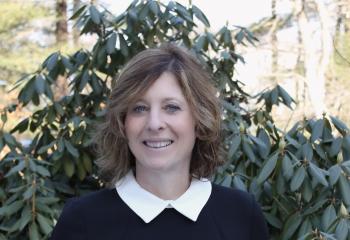On the hunt for better environmental health

Lisa Chan
Perinatal professional practice specialist Lisa Chan has advocated and supported women, children, and families as a nurse for more than 30 years. After witnessing the declining health of the women she was treating, she developed the Green Nursing Project Initiative to educate nurses, nursing students, and patients about the adverse health effects linked to chemicals in consumer products. Chan shares her latest adventure in environmental health, taking part in an EPA Energy Star Treasure Hunt to reduce greenhouse gas emissions at a Massachusetts hospital.
Lisa Chan, MSN, RNC-OB, is a perinatal professional practice specialist at Women & Infants Hospital in Rhode Island. When asked about what sparked her interest in choosing nursing as her profession, she recounts a hospitalization she experienced as a child, “Parents at this time did not typically stay with their children in the hospital. I had the same, kind nurse take care of me both nights. She made me feel safe when I was uncomfortable and in an unfamiliar place without my mom around. I remember later, I picked out a Barbie doll nurse that reminded me exactly of her.”
For more than 30 years, Chan has spent time at the bedside, supporting and advocating for women, children, and families as a nurse. A decade ago, Chan became concerned about the increasing adverse health conditions she was seeing in her community and the declining health of the women she was treating as an obstetric staff nurse.
“When I dug into the research, I realized that chemicals in common products used by people every day were mostly unregulated,” she says. “These chemicals were being connected to many behavioral and neurologic problems like ADHD and autism, along with infertility, obesity, diabetes, cancers, and other adverse health conditions that I was concerned about. I began my mission to tell anyone I could about it.”
Chan started the Green Nursing Project Initiative in 2014 to share information with nurses, nursing students, and patients about the adverse health effects linked to chemicals in consumer products. She’s educated hundreds of nurses, nursing students, and health professionals and has provided samples of sustainable homemade products, sharing recipes, and other resources to encourage them to reduce toxins in their home environments and share their knowledge with patients.
“When I can get people to investigate and improve their own personal environment, they are more likely to begin opening up to a more global view of the environment,” says Chan. “I feel like people are feeling more of a sense of urgency for taking action related to climate and health.”
In addition to being a Nurse Climate Champion, Chan is active in the Alliance of Nurses for Healthy Environments and is currently serving as a mentor for the ANHE fellowship program.
Recently, Chan was invited to join an EPA Energy Star Treasure Hunt at Cambridge Hospital in Massachusetts as a Nurse Climate Champion. The purpose of these hunts is to reduce greenhouse gas emissions by identifying opportunities within an organization to save energy, either by optimizing operations or implementing behavioral changes.
Before starting the treasure hunt, Chan watched three video resources explaining the process and goals. The next step was a two-day workshop and analysis during which attendees across hospital departments were separated into interdisciplinary teams. Chan’s teammates included the vice president of facilities operations, a facilities manager, a sustainability program manager, and an implementation project manager.
“We spent much of the first day touring our assigned units, making observations, speaking with staff, and taking notes,” she recalls. “Our team discussed priorities and investigated the feasibility of implementation related to our cost analysis. Each team was challenged to locate no-cost or low-cost opportunities.”
Many of the opportunities Chan’s team found related to improving or expanding existing operations, educating staff and modifying behaviors such as putting computers in power-save mode, and encouraging a culture of environmental sustainability.
At the end of the second day, the teams created spreadsheets and PowerPoint presentations sharing data, photos, the no-cost or low-cost opportunities, and calculating cost-savings. They then presented the information to hospital administrators.
“It was such a rewarding experience to see that our teams collectively were able to find $245,352 of potential savings opportunities the hospital could take advantage of,” Chan says.
“When I told my chief operation officer, he was just as excited about the possibility of our hospital being green and saving money as I was,” Chan says. Women & Infants Hospital is working on an application for a hunt next year.
Chan encourages other nurses to participate in treasure hunts and other sustainability efforts.
“As employees that are on the ground, nurses can be the eyes for energy-saving opportunities once they are educated about what to look for. As part of the treasure hunt team, nurses offer a unique perspective from the staff and patient points of view,” Chan says. “It also empowers nurses to become climate advocates and ambassadors for sustainability in their organizations.”
She hopes to inspire nurses and health professionals to get more involved in climate challenges, taking action to make a difference at home, in their workplaces, and globally.
“Nurses are called to advocate and care for the needs of patients, families, and communities. Part of this holistic calling is understanding how the patient’s physical and emotional environment affects their health and how the physical, spiritual, and emotional space we provide affects our care for families,” Chan says. “Nurses have a professional responsibility to care about the current and future state of environment because it has a tremendous effect on the health of our patients and the health of future generations.”
